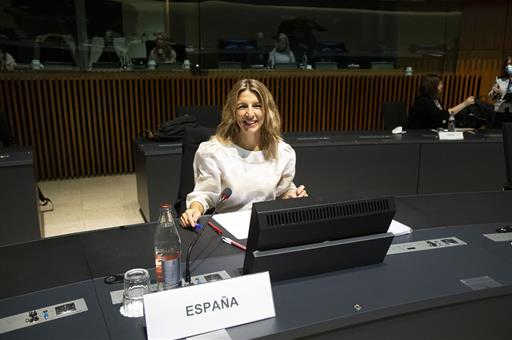Yolanda Díaz presents EPSCO's Social Alert Mechanism in Luxembourg, which is warmly welcomed by EPSCO
News - 2021.10.15
The Second Vice-President of the Government of Spain and Minister for Work and Social Economy, Yolanda Díaz, presented the Social Alert Mechanism to the European Union's Employment, Social Policy, Health and Consumer Affairs Council (EPSCO), which is being held in Luxembourg.
The Social Imbalance Procedure (SIP) is a system promoted by Spain and Belgium to establish a series of indicators to detect social imbalances that need to be corrected. "We want to incorporate social indicators that serve as indicators in the European semesters, to enable social equalisation," explained Díaz.
The proposal was warmly welcomed by ministers present at EPSCO, who underlined the opportunity it represents and the importance of starting work as soon as possible in the Employment and Social Protection Committees to consolidate a mechanism that can be implemented and become operational as soon as possible.
This initiative, the minister explained, is based on the conviction that social indicators have the same relevance and impact as macroeconomic indicators, especially if we aspire to a Europe that is ambitious in terms of rights, that is socially strong, with a strong and inclusive economy. "Our proposal puts people first and serves to reconcile social justice with economic solvency in the certainty that governance is only effective when it is socially just," said Díaz.
A stronger social dimension in the European Union
The Vice-President called for a greater social dimension in the European Union's public policies. "We have come a long way in the social debates in the European Union (EU). We must define a greater presence of EPSCO in the EU, which is not only built on economic governance", the minister insisted.
Díaz explained to her European counterparts that the social values that drove the Reconstruction and Resilience Plans need to be transferred to the day-to-day functioning and management of the European Union, from its guiding principles to the most specific public policies.
She therefore called for EPSCO to be placed on the same level within the Union as the Economic and Financial Affairs Council (ECOFIN). "We need a European project that is useful for citizens," said Díaz, who is convinced that the crisis has clearly demonstrated the need for a social and inclusive approach that puts work at the centre and eliminates precariousness - key issues for the European Union.
Bilateral meeting with Finland
On the fringes of the EPSCO Council, the Vice-President also met with the Finnish Minister for Social Affairs and Health, Hanna Sarkinnen, with whom she discussed how to strengthen the social dimension of the European bloc.
The Finnish minister has shown particular interest in the Social Alert Mechanism and has expressed her willingness to support it within the EU and to join the initiative.
The meeting, which took place in an atmosphere of very good understanding and closeness between the two ministers, also addressed the issue of mental health in relation to health and safety at work and, in particular, job insecurity, areas to which Finland attaches particular importance.
Díaz told Sarkinnen that Spain is working on setting up a committee of experts to study the link between precariousness and mental health.
The vice-president underlined the importance for Spain of guaranteeing mental health in the workplace, and the two ministers agreed to continue the dialogue in order to exchange experiences.
Non official translation





